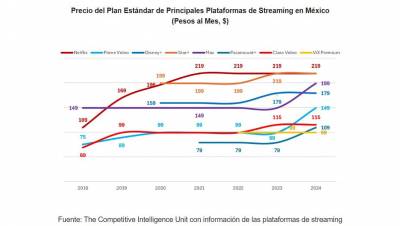 The entertainment industry has based its evolution on understanding that what a user is looking for are experiences. Linear TV has an important challenge in this regard because it must evolve very quickly, hand in hand with digital.
The entertainment industry has based its evolution on understanding that what a user is looking for are experiences. Linear TV has an important challenge in this regard because it must evolve very quickly, hand in hand with digital.
Juan Pablo Morales Sarmiento*
The trend of content consumption shows every day a greater acceleration of the participation of the Internet as a means of communication, to such an extent that some analysts have come to affirm that television, as we know it now, would disappear in the medium term.
I think that television has already disappeared as we used to know it, because the evolution of the dynamics of the message has already forced the medium to evolve in the same way.
During the LA Screenings, in May of this year, some of the most important TV executives in the region said they are involving business strategies that seek, through digital platforms, to interact with their audiences, engage with alternative and complementary content, as well as monetize with subscription and advertising mechanisms.
The main objective of the media is not the contents or the messages, but their users or consumers.
What is being debated is the route and future of exclusively linear TV as a business model, which clearly has already disappeared taking into account the previous arguments. And while the results of the first quarter showed in the United States, a much greater reduction than ever in the number of Pay-TV users, with a loss of more than 800,000 subscribers, and with a consumption of content based on digital platforms that does not stop growing, executives, advertisers, producers and programmers are taking measures to adapt to the market.
But what does the demise of TV really mean?
Beyond the typical discussion based on the idea that digital offers what users want to consume, at the time, place and device they want, this theory is the result of the appearance of business models that took advantage of something that has the internet and that linear TV will never be able to match: User Experience.
Offering on-demand, mobile, user-generated content, distributed by social, interactive and personalized platforms; The Internet will always lead the way against linear TV.
This is how the future of TV will continue to be built on the following foundations:
Those who develop production must find narrative and communication alternatives that integrate with the digital way of life, through techniques that allow the easy localization, adaptation, gamification, socialization and programming of their concepts and the messages they want to share.
Programmers will have to become much more involved in the digital and social behavior of their audiences, selecting creative content that can preferably be supported in converged media.
The entire industry must focus on the detailed metrics available, to know, one by one, its users, and thus know what they consume and what they need, so that they can offer segmented, accurate and increasingly effective advertising.
Advertisers will have to be more actively involved in each phase of the industry's value chain, including from the creative and strategic process, making the content their own, as well as deciding the media they know and that have better access to the consumer profile they want to connect to.
Audiences will surely continue to choose your content according to their own convenience, so it is preferable to be on your side, because otherwise it means not being.
The entertainment industry has based its evolution on understanding that what a user is looking for are experiences. Linear TV has an important challenge in this regard because it must evolve very quickly, hand in hand with digital, to hybrid models that allow linear consumption to accelerate, with online mechanisms, based on fast and flexible dynamics. Traditional TV knows what Show Business is like, now it only takes a little articulated and teamwork, creativity and daring to monetize the experiential strategies that the online world continuously opens up to it.
*Juan Pablo Morales Sarmiento is CEO of Nuevos Medios. You can contact him through his Twitter account @JuanPMoralesS.

























Leave your comment